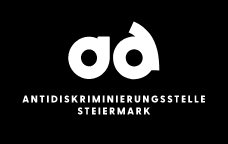Antidiscrimination Office Styria
The Antidiscrimination Office Styria is a Helping Hands Graz project financed by the Styrian government and the city of Graz.
The goal of the project is to strengthen antidiscrimination work and to raise awareness of the Styrian population.
The Antidiscrimination Office Styria is a single point of contact, clearing, advising and monitoring office. People who feel discriminated against have the opportunity to lodge their complaints. The case is then recorded, possibilities of intervention pointed out, and support given by the Antidiscrimination Office and other specialized offices.
The four pillars of the Antidiscrimination Office are:
- Single point of Contact, Clearing and Counselling Office
Persons who feel discriminated against can contact the office regardless of the reasons of discrimination and legal framework. The reasons for discrimination are larger than the reasons recognized by the Austrian Antidiscrimination Law:
Reasons for discrimination Article 21 Charter of Fundamental Rights of the European Union:
Sex, race, ethnic or social origin, genetic features, language, religion or belief, political or other views, national minorities, property, birth, disability, age or sexual orientation... - Monitoring and Academic Support
Everyone has the chance to report discrimination cases. As a consequence, discrimination status quo can be elevated, leading to measures of prevention. - Networking Initiator and Engine
In order to address antidiscrimination collectively, as well as to strengthen the partners and build up competences, the Antidiscrimination Office is establishing an antidiscrimination network in Styria. - Promoting and Raising Awareness
Workshops for affected people, and raising awareness for the issues connected to discrimination.
Goals
Low threshold
- Our goal is that those who visit our office will not have to bother with admission prerequisites
- The Antidiscrimination Office should, through its supervision work, serve as a contact point for the public. In that way, its activities, as well as concerns raised by individuals, will become evident
Searching
- Our goal is not to wait for people to come find us, but to make people aware of our counselling work as a preventative effort
- Active contact with institutions, organisations, communities, etc.
Extensive discrimination protection for everyone
- There is legal protection for specific characteristics within specific areas. Examples include gender, disability, or ethnic affiliation in working area, or gender and ethnic affiliation in private areas.
- There are other people whose experience with discrimination falls under the same legally protected categories, such as belonging to a specific origin or social class, health status, etc.
- We are the contact point for all people in such or similar situations; for those who experience discrimination, and for those want to defend themselves against it.
Regionally represented
Networking, complementary and co-operational
Antidiscrimination Office – why?
- In 2002, an Antidiscrimination Plan originating from the "inventory" of the City of Human Rights was developed. Point 3 suggested a creation of an Antidiscrimination Office: "This independent office should take care of all cases connected to discrimination based on skin colour, origin, religion, language, age, disability, as well as sexual orientation. It could exercise monitoring functions and if needed, refer to specialised institutions. Nevertheless, it should be equipped with adequate expertise itself. When it comes to a target group of migrants, it can be referred to the "Anti-Racism Hotline." The creation of such an institution is to be planned by the political parties ÖVP and Grünen. The Integrationsreferat (Department for Integration) is assigned to create a model based on the 2003 concept of the Graz's Büro für Frieden und Entwicklung (Graz's Office for Peace and Development)." (Menschenrechtsbeiratsbericht der Stadt Graz 2007, page 80)
- Coalition Agreement between Graz's political parties, Volkspartei and the Grünen- alternative Liste, for the district council period 2008-2013: Measures within the area of City of Human Rights, mid-term: "Establishment of an Antidiscrimination Office of Advocacy" (page 20)
- A 10-point program consisting of specific measure implementation for prevention and suppression of racism as part of joining the European City Coalition against Racism: "Victim support, in order to defend themselves against racism and discrimination more effectively" (point 3 of the 10 points program)
- Recommendation of the Human Rights Council of the City of Graz: "The Human Rights Council recommends the city of Graz to improve and broaden legal protection against discrimination. The city of Graz should perceive, document, and take legal action in discrimination cases, as well as to continually enhance victim protection for discrimination victims." (Article of Human Rights of the City of Graz 2007, page 34)
- One of the goals, according to Point 3.3 from the Charter of Coexistence in Diversity in Styria, is to make a firm stand against discrimination, especially discrimination based on gender, skin colour, religion, national and social origin, sexual orientation, age, disability, etc.
- ECRI (European Commission against Racism and Intolerance): ECRI article regarding Austria on 2 March 2010, recommendation 39: "We at ECRI noticed that there is a large fragmentation when it comes to anti-discrimination legislation (more than 20 national and federal state laws), and that there are many institutions and lawsuits. This leads to a complexity of the Austrian system, which cannot simply be justified by federal structure. Furthermore, by doing this, it can keep the public at distance and in that way, compromise its efficiency. That is a weak point at which not only representatives of civil society have indicated, but also several international institutions." (page 25)
Commentary
Many years of counselling at Anti-Racism Hotline have clearly shown the importance of a single point of contact, clearing, monitoring and counselling office which runs a systematic documentation of discrimination cases. By public disclosure of summoned data, it helps to break the silence connected to racism and discrimination in many areas, determines its causes, and enables prevention and suppression of discrimination.
For example, everyday racism conducted in public places, which is an important type of discrimination, has risen 5% this year. The reasons for this increase are unknown.
For sociologists L.Berger and Thomas Luckmann, "everyday life" is the defining area in which people have their experiences. Accordingly, "small" forms of racism can be especially hurtful, and are taken in by the victims, agents, and "uninvolved" persons.
The innovation of the Antidiscrimination Office lies therefore in its attention to a variety of discrimination causes: gender, skin colour, ethnic or social origin, genetic features, language, religion, political or any other ideology, national minority, wealth, birth, disability, age or sexual orientation (EU Charter of Fundamental Rights).
Each discrimination experience, regardless of its cause and legality, is a violation of the dignity of the affected person, which, according to the Universal Declaration of Human Rights, should be supported: equality before the law and protection against discrimination is a universal human right. In this way, any kind of preference regarding discrimination cases is avoided, and protection is equally ensured for all discriminated groups.


 »
»